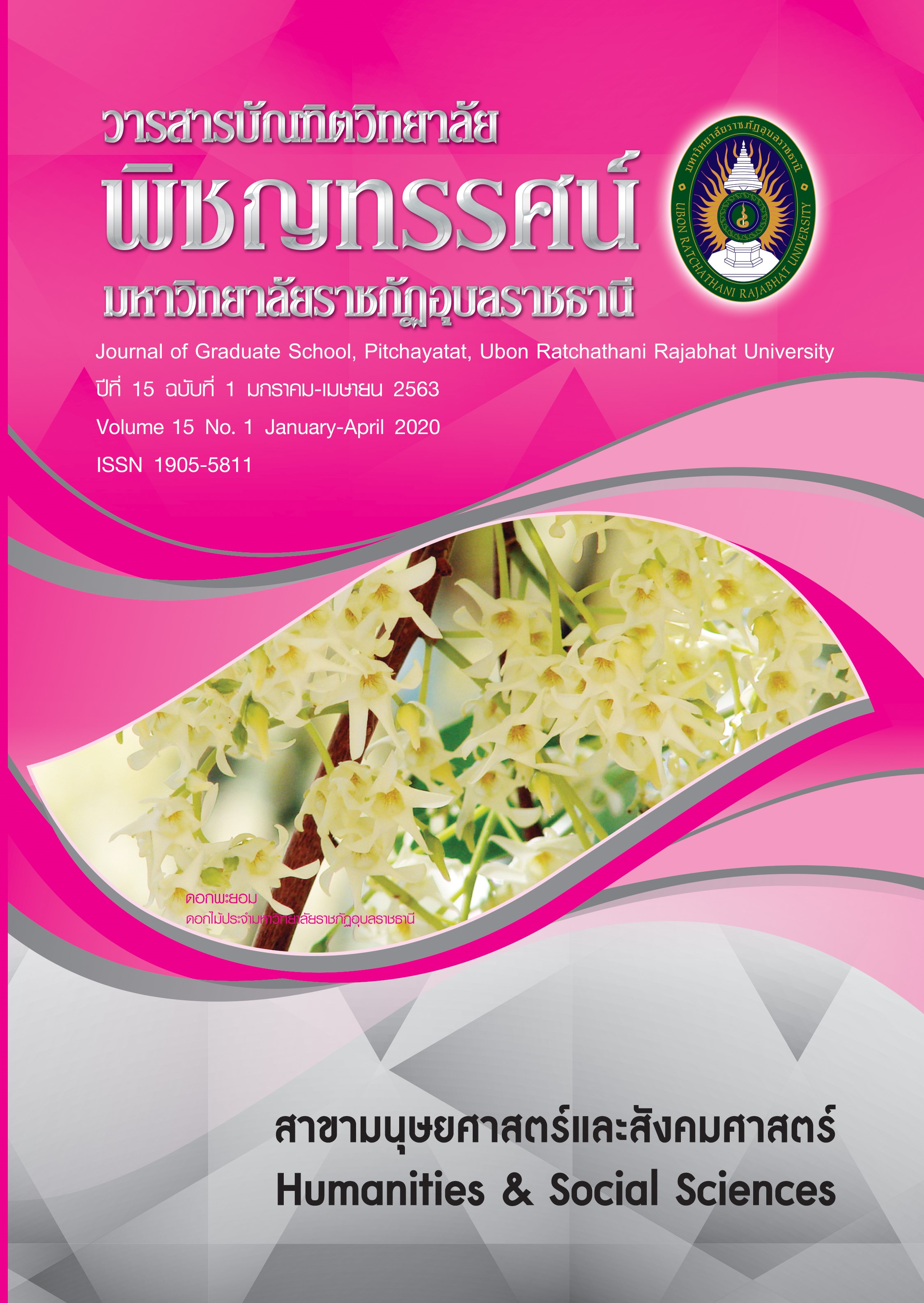การพัฒนาหลักสูตรฝึกอบรมการให้บริการโดยใช้ปัญหาเป็นฐาน ของพนักงานต้อนรับโรงแรมในเขตภาคตะวันออกเฉียงเหนือ
คำสำคัญ:
หลักสูตรฝึกอบรม, การให้บริการ, การเรียนรู้โดยใช้ปัญหาเป็นฐาน, พนักงานต้อนรับโรงแรมบทคัดย่อ
การวิจัยนี้มีวัตถุประสงค์เพื่อ 1) ศึกษาองค์ประกอบของการให้บริการของพนักงานต้อนรับโรงแรมในเขตภาคตะวันออกเฉียงเหนือ 2) พัฒนาหลักสูตรฝึกอบรมการให้บริการโดยใช้ปัญหาเป็นฐานของพนักงานต้อนรับโรงแรมในเขตภาคตะวันออกเฉียงเหนือ และ 3) ประเมินหลักสูตรฝึกอบรมการให้บริการโดยใช้ปัญหาเป็นฐานของพนักงานต้อนรับโรงแรมในเขตภาคตะวันออกเฉียงเหนือ ตัวอย่างคือพนักงานต้อนรับโรงแรมจำนวน 440 คน เครื่องมือคือ แบบสอบถามแบบ มีค่าความเชื่อมั่น .95 สถิติที่ใช้ได้แก่ ค่าเฉลี่ย ส่วนเบี่ยงเบนมาตรฐาน การวิเคราะห์องค์ประกอบใช้สถิติวิเคราะห์องค์ประกอบเชิงสำรวจ และการทดสอบทีแบบกลุ่มสัมพันธ์
ผลการวิจัยพบว่า
- องค์ประกอบการให้บริการของพนักงานต้อนรับโรงแรมในเขตภาคตะวันออกเฉียงเหนือ ประกอบไปด้วย 7 องค์ประกอบ ดังนี้ 1) การบริการและการสื่อสาร 2) ภาวะผู้นำและการคาดการณ์พฤติกรรมลูกค้า 3) การจัดการและการตลาด 4) การจัดการความหลากหลายทางวัฒนธรรม 5) การใช้เทคโนโลยีในการปฏิบัติงาน 6) การจัดการงานธุรการ และ 7) การทำงานเป็นทีม
- โครงร่างหลักสูตรประกอบด้วย 1) ชื่อหลักสูตร 2) สภาพปัญหาและความจำเป็นของหลักสูตร 3) การพัฒนาหลักสูตรฝึกอบรม 4) หลักการของหลักสูตร 5) จุดมุ่งหมายของหลักสูตร 6) โครงสร้างของหลักสูตร 7) เนื้อหาของหลักสูตร 8) กิจกรรมและวิธีการอบรม 9) สื่อประกอบการอบรม และ 10) การวัดและการประเมินผล 3. ผลการประเมินหลักสูตร พบว่าพนักงานผู้เข้ารับการอบรมมีคะแนนค่าเฉลี่ยความรู้ ความสามารถ หลังสิ้นสุดการทดลองสูงกว่าก่อนอบรม และหลังอบรม 8 สัปดาห์สูงกว่าหลังสิ้นสุดอบรม และผลการปฏิบัติงานของผู้เข้ารับการอบรมหลังอบรม 8 สัปดาห์สูงกว่าก่อนอบรม และผู้เข้ารับการอบรมมีความพึงพอใจต่อการใช้หลักสูตรอยู่ในระดับมากถึงมากที่สุด
เอกสารอ้างอิง
จิตตินันท์ นันทไพบูลย์. ธุรกิจโรงแรม. กรุงเทพฯ: สำนักพิมพ์ซีเอ็ดยูเคชั่น, 2555.
ณพสร สวัสดิบุญญา, และคณะ. “รูปแบบการฝึกอบรมหัวหน้าแผนกวิชาเพื่อพัฒนาหลักสูตรฝึกอบรมการเรียนรู้โดยใช้ปัญหาเป็นฐานในการจัดการเรียนการสอน,” วารสารวิชาการพระจอมเกล้า-พระนครเหนือ. 21, 2 (2554): 387-395.
ดนยา อินจำปา. การพัฒนาหลักสูตรฝึกอบรมการดูแลเด็กที่มีความบกพร่องทางสติปัญญาสำหรับผู้ดูแลเด็กศูนย์การศึกษาพิเศษ. วารสารวิชาการบัณฑิตวิทยาลัยสวนดุสิต. 14, 3 (2561): 195-208.
วรรณวิสา แย้มทัพ. การพัฒนาชุดฝึกอบรมสมรรถนะวิชาชีพพนักงานรักษา-ความปลอดภัย. ดุษฎีนิพนธ์ปรัชญาดุษฎีบัณฑิต มหาวิทยาลัยรามคำแหง, 2558.
วรรณี อึ้งสิทธิพูนพร. “ความพึงพอใจในการฝึกอบรมการใช้ภาษาอังกฤษในชั้นเรียนของครูภาษาอังกฤษใน สถานศึกษาขั้นพื้นฐาน สังกัดสำนักงานเขตพื้นที่การศึกษา จังหวัดสุพรรณบุรี,” Veridian E-journal. 8, 3 (2558): 1023 – 1036.
สุดารัตน์ ครุฑกะ. การพัฒนาหลักสูตรฝึกอบรมเพื่อเสริมสร้างสมรรถนะที่พึงประสงค์ของหัวหน้าพยาบาลในระบบบริการสุขาภาพในอนาคต. ดุษฎีนิพนธ์ปรัชญาดุษฎีบัณฑิต มหาวิทยาลัยรามคำแหง, 2550.
ส่งเสริมวิสาหกิจขนาดกลางและขนาดย่อม, สำนักงาน. โอกาสและความเสี่ยงของธุรกิจโรงแรม ท่องเที่ยว และภัตตาคารเมื่อไทยเข้าสู่ AEC. (ออนไลน์) 2559 (อ้างเมื่อ 30 ตุลาคม 2560). จาก http://www.sme.go.th
อรุณรุ่ง โยธสิงห์ และสำราญ กำจัดภัย. “การพัฒนาหลักสูตรฝึกอบรมตามแนวคิดการเรียนรู้แบบผสมผสานเพื่อเสริมสร้างสมรรถนะด้านการประเมินที่เน้นผู้เรียนเป็นสำคัญของครูผู้สอนระดับประถมศึกษา,” วารสารศิลปากรศาสตร์วิจัย. 8, 2 (2559): 270-284.
อารีรักษ์ มีแจ้ง และสิริพร ปาณาวงษ์. “การพัฒนาหลักสูตรฝึกอบรมครูภาษาอังกฤษโดยใช้ปัญหาเป็นฐานสำหรับครูผู้ช่วยสอนช่วงชั้นที่ 2,” วารสารศึกษาศาสตร์ มหาวิทยาลัยนเรศวร. 12, 2 (2553): 17-31.
Caukin, N., Killard, H., and Goodin, T. “A problem-based learning approach to teacher training: finding after program redesign,” SRATE Journal, 25, 2 (2016): 26-32.
Hai-yan, K., and Baum, T. “Skills and work in the hospitality sector: The case of hotel front office employees in China,” International Journal of Contemporary Hospitality Management. 18, 6, (2006): 509-518.
Oliva, P. F. Developing the curriculum. 3rd ed. New York: Harper Collins, 1992.
Sharon, T. R., Goziker, O. adn Shahrabani, S. “Factors affecting the decision to remain in the hospitality industry among hotel front office desk employees: The case of Israel,” Journal of Tourism and Hospitality Management. 2, 9 (2014): 364-375.
Soto, S. T. “An analysis of curriculum development,” Theory and Practice in Language Studies. 5, 6 (2015): 1129-1139.
ดาวน์โหลด
เผยแพร่แล้ว
รูปแบบการอ้างอิง
ฉบับ
ประเภทบทความ
สัญญาอนุญาต
บทความทุกเรื่องได้รับการตรวจความถูกต้องทางวิชาการโดยผู้ทรงคุณวุฒิภายนอกอย่างน้อย 3 คน ความคิดเห็นในวารสารพิชญทรรศน์เป็นความคิดเห็นของผู้นิพนธ์มิใช่ความคิดเห็นของผู้จัดทำ จึงมิใช่ความรับผิดชอบของวารสารพิชญทรรศน์ และบทความในวารสารพิชญทรรศน์สงวนสิทธิ์ตามกฎหมายไทย การจะนำไปเผยแพร่ต้องได้รับอนุญาตเป็นลายลักษณ์อักษรจากกองบรรณาธิการ





